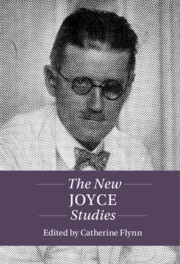Book contents
- The New Joyce Studies
- Twenty-First-Century Critical Revisions
- The New Joyce Studies
- Copyright page
- Contents
- Figures
- Notes on Contributors
- Acknowledgments
- Abbreviations
- Introduction
- Part I Scope
- Part II Fragment and Frame
- Part III Perspective
- Chapter 12 Joyce’s Nonhuman Ecologies
- Chapter 13 Joyce and the (Critical) Medical Humanities
- Chapter 14 The Epistemology of the Pantry A Queer Inventory of James Joyce’s “The Dead”
- Chapter 15 Revisiting the Early Reception of Finnegans Wake in 1939
- Chapter 16 Joyce and Critical Theory
- Bibliography
- Index
Chapter 14 - The Epistemology of the PantryA Queer Inventory of James Joyce’s “The Dead”
from Part III - Perspective
Published online by Cambridge University Press: 01 September 2022
- The New Joyce Studies
- Twenty-First-Century Critical Revisions
- The New Joyce Studies
- Copyright page
- Contents
- Figures
- Notes on Contributors
- Acknowledgments
- Abbreviations
- Introduction
- Part I Scope
- Part II Fragment and Frame
- Part III Perspective
- Chapter 12 Joyce’s Nonhuman Ecologies
- Chapter 13 Joyce and the (Critical) Medical Humanities
- Chapter 14 The Epistemology of the Pantry A Queer Inventory of James Joyce’s “The Dead”
- Chapter 15 Revisiting the Early Reception of Finnegans Wake in 1939
- Chapter 16 Joyce and Critical Theory
- Bibliography
- Index
Summary
Patrick Mullen returns to familiar textual moments to discover new forms of Joyce’s subversion of dominant discourses. He detects in moments in “The Dead” such as Lily’s exchange with Gabriel, Molly Ivors’ discussion with Gabriel, and Gabriel’s thoughts on Michael Furey a kind of queerness he associates with “heteronormative failure”: the refusal to marry, the rejection of conventional gender roles, and the experience of homoerotic desire. Adapting Eve Kosofsky Sedgwick’s notion of the sexual closet, he writes of the pantry as the emblem and at times the literal location in Joyce’s story of these alternative behaviors. He traces the subtle presence of these non-normative behaviors in the story’s free indirect discourse; in contrast to the unfettered access to an individual’s thoughts purportedly offered by the stream of consciousness, “The Dead” contains in its conventional third-person narrative voice marginalized perspectives that form unexpected alliances across the globe.
- Type
- Chapter
- Information
- The New Joyce Studies , pp. 222 - 234Publisher: Cambridge University PressPrint publication year: 2022

